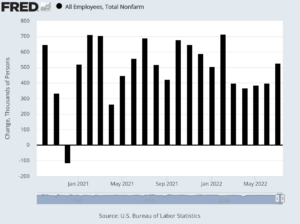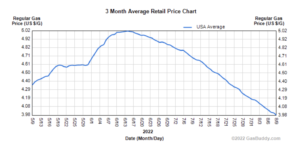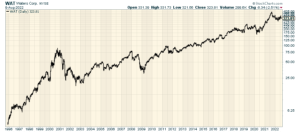CWS Market Review – August 9, 2022
(This is the free version of CWS Market Review. If you like what you see, then please sign up for the premium newsletter for $20 per month or $200 for the whole year. If you sign up today, you can see our two reports, “Your Handy Guide to Stock Orders” and “How Not to Get Screwed on Your Mortgage.”)
The Blow-Out July Jobs Report
Last Friday, the Bureau of Labor Statistics released the jobs report for July, and it was much stronger than analysts had been expecting. According to the government, the U.S. economy created 528,000 net new jobs during the month of July. That was more than double expectations.
This report came in for especially close scrutiny since the last two GDP reports were negative. While that’s not a recession according to the technical definition, it certainly is cause for concern. Even though there are pockets of weakness in the economy, such as business and residential construction, the labor market has been holding up well. At least for now.

I don’t believe we’re currently in a recession, and some folks are being unduly alarmist. However, I am concerned that a recession may start sometime in the next six to 12 months. That’s why it’s crucial for investors to maintain a conservative posture. This is especially true with rising inflation and interest rates.
One encouraging sign is that the U.S. economy just passed an important threshold: the economy has now made back all the jobs it lost during the economic shutdown of 2020. In two months, the economy shed 21.991 million jobs, but in the 27 months since then, we’ve made them all back. Add it all up and in a 29-month period, the U.S. created a grand total of 32,000 jobs.
Still, there are parts of the economy that suffered greatly during the lockdowns. If the economy were to have the same jobs-to-population ratio that we had two years ago, then we would need an additional 1.7 million new jobs.
According to the jobs report, the unemployment rate fell to 3.5% last month which matches a 50-year low. I dug through the data and calculated the jobless rate number out for a few decimal places. To be absolutely precise, the unemployment rate for July was 3.458%. That’s the lowest unemployment rate since May 1969.
I was impressed with how broad the jobs gains are. For example, leisure and hospitality added 96,000 jobs last month. Of that, 74,000 was in bars and restaurants. This is an important number to watch because that sector has been a laggard since the lockdowns. It’s still 7% below the high from early 2020. It’s a good sign that more people are going out.
Professional and business services added 89,000 jobs last month. This is a sector that hasn’t been impacted as much as many others. It’s up nearly a million jobs since pre-Covid.
The public sector added 57,000 jobs last month, mostly teachers. The only major industry to lose jobs last month was auto manufacturing, which lost 2,200 jobs.
The labor force participation rate slipped a bit in July. This is important because we want to see how many people are looking for work. If you’ve given up looking, then the government doesn’t count you as unemployed. Labor force participation has mostly improved over the last two years, but it needs to go even further.
A better measure of the labor force participation rate is to look at prime working-age people (ages 25 to 54). That’s improved over the last two years, but it’s not quite where it was prior to the recession of 2020.
For the most part, the stock market didn’t do much of anything in the wake of this report. During the day yesterday, the S&P 500 reached its highest point in three months. However, it gave that back by the closing bell.
The index has now fallen for the last four days, but it’s been modest losses. The next big test for the market comes tomorrow when the government releases the inflation report for July. This will be important because it will be the first report that includes the recent drop in oil prices.
This raises an interesting topic: how does the unemployment rate impact the stock market? A few years ago, I looked at the numbers. I took all the monthly unemployment rates since 1948 and saw how the market performed in those months.
I then divided the months into four groups based on the current unemployment rate. The four groups were under 4%, 4% to 6%, 6% to 8% and over 8%. This is the S&P 500’s annualized price return by unemployment rate since 1948:
Under 4%: +4.71%
4% to 6%: +7.83%
6% to 8%: +18.09%
Over 8%: +22.17%
This makes sense. The best time to invest is when the economy is in rough shape. Meanwhile, when the economy is humming along is a good time for the bears to strike. I should caution you against reading too much into this kind of analysis. The market is made up of people and it’s only as rational as its most impassioned trader. As long as inflation weighs on the market, investors will be nervous.
The price for oil is a very important piece of the monthly CPI report. According to GasBuddy, the average price for gasoline peaked at just over $5 per gallon in mid-June. Since then, it’s fallen consistently and gasoline in now under $4 per gallon.

The inflation report for June showed that consumer prices rose by 9.1% over the prior 12 months. In simple terms, for every $11 dollars you had one year ago, today you have the buying power of $10. The core rate, which excludes food and energy, is “only” up 5.9% over the past year. That 12-month core rate has gradually ticked down over the last three months. I’ll be curious to see if it hits four months in a row.
I suspect that the jobs numbers will soon slow down. That’s a result of the higher interest rates from the Fed. Ultimately, that will reduce demand. That will force companies to cut costs, and an easy way to do that is to hold back on hiring new people.
We’re nearly finished with the Q2 earnings season, and it’s been a decent one. For now, the S&P 500 is on pace to record earnings growth of 9.63% compared with last year’s Q2. The energy sector is looking to quadruple its profits over last year. The big loser is the consumer discretionary sector which is down 14.23% over last year. So far, 76.0% of companies have beaten expectations, although those are much-reduced expectations.
The Federal Reserve doesn’t meet again until late September. Thanks to Friday’s jobs report, Wall Street is expecting another 0.75% rate increase. After that, however, the outlook gets cloudy.
Traders expect 0.25% hikes in November and December. Then begins a long pause. Traders expect the Fed to hold its target range at 3.50% to 3.75% for the entire first half of next year. They see a rate cut by July as a 50-50 bet. It’s extraordinary that investors expect a U-turn in Fed policy so quickly.
Stock Focus: Waters Corporation
I wanted to update you on a stock I’ve discussed before, Waters Corporation (WAT). I like this company a lot. Even though it’s not well-known to investors, Waters is one of the world’s leading specialty measurement companies.
The company was founded in 1958 by James Waters. He passed away last year at the age of 95. Waters got his big break in 1972 when he solved a complicated problem for Robert Woodward, a Nobel Prize-winning chemist at Harvard. Waters went to Woodward’s lab with a liquid chromatograph and helped solve the problem within a few weeks.
Waters is headquartered in Milford, Massachusetts. After 74 years, it’s become a pretty big outfit. The company currently has over 40,000 customers and a workforce of 7,800 employees. Waters went public in 1995 and the shares are up 86-fold since then. This year, Waters is on track to register nearly $3 billion in revenue. The current market cap is $19.5 billion. Waters is also a member of the S&P 500.
So what do they do? The company makes, sells and services high-performance liquid chromatographs, ultra-performance liquid chromatographs and mass spectrometers. Waters operates through two segments, Waters and TA (for thermal analyzers).
If you’re like me, then you probably rarely find yourself in the market for a spectrometer. Or maybe never. But there are lots of businesses who love them and buy them. But what do these things do? Spectrometers help identify chemical compounds. This is important for drug development, food testing, and air and water quality testing. Waters also designs and sells thermal analysis, rheometry and calorimetry instruments through its TA product line.
This is normally a very good business to be in. Waters has a high “moat” which means it’s well-protected from competitors. That’s the kind of company I like to buy. Waters often delivers operating profit margins near 30%.
Check out its long-term performance:

A sign of a good long-term chart is when you can barely make out the numbers for the Y-axis.
Being a growth stock, shares of Waters got beaten up in recent months. The stock peaked at $428 per share about this time last year. By the time of its recent low in April, Waters had shed $140 per share.
Despite the drop, Waters has continued to deliver very good earnings. Waters earned $11.20 per share last year. Wall Street expects earnings of $12.08 per share for this year and $13.18 per share in 2023. Last week, Waters reported another solid quarter. For Q2, Waters made $2.75 per share which beat the Street by nine cents per share.
Let’s look at guidance. The company said it expects earnings to range between $2.50 and $2.60 per share for Q3. For the full-year, Waters said to expect earnings between $11.95 and $12.05 per share. That’s almost certainly too low. I’d say that $12.20, give or take, is more accurate.
I used to think that Waters was overpriced but the recent selloff has made the stock much more attractive. This is one I’m going to be taking a close look at when it’s time to update our portfolio at the end of this year.
That’s all for now. I’ll have more for you in the next issue of CWS Market Review.
– Eddy
Posted by Eddy Elfenbein on August 9th, 2022 at 7:32 pm
The information in this blog post represents my own opinions and does not contain a recommendation for any particular security or investment. I or my affiliates may hold positions or other interests in securities mentioned in the Blog, please see my Disclaimer page for my full disclaimer.
-
-
Archives
- April 2025
- March 2025
- February 2025
- January 2025
- December 2024
- November 2024
- October 2024
- September 2024
- August 2024
- July 2024
- June 2024
- May 2024
- April 2024
- March 2024
- February 2024
- January 2024
- December 2023
- November 2023
- October 2023
- September 2023
- August 2023
- July 2023
- June 2023
- May 2023
- April 2023
- March 2023
- February 2023
- January 2023
- December 2022
- November 2022
- October 2022
- September 2022
- August 2022
- July 2022
- June 2022
- May 2022
- April 2022
- March 2022
- February 2022
- January 2022
- December 2021
- November 2021
- October 2021
- September 2021
- August 2021
- July 2021
- June 2021
- May 2021
- April 2021
- March 2021
- February 2021
- January 2021
- December 2020
- November 2020
- October 2020
- September 2020
- August 2020
- July 2020
- June 2020
- May 2020
- April 2020
- March 2020
- February 2020
- January 2020
- December 2019
- November 2019
- October 2019
- September 2019
- August 2019
- July 2019
- June 2019
- May 2019
- April 2019
- March 2019
- February 2019
- January 2019
- December 2018
- November 2018
- October 2018
- September 2018
- August 2018
- July 2018
- June 2018
- May 2018
- April 2018
- March 2018
- February 2018
- January 2018
- December 2017
- November 2017
- October 2017
- September 2017
- August 2017
- July 2017
- June 2017
- May 2017
- April 2017
- March 2017
- February 2017
- January 2017
- December 2016
- November 2016
- October 2016
- September 2016
- August 2016
- July 2016
- June 2016
- May 2016
- April 2016
- March 2016
- February 2016
- January 2016
- December 2015
- November 2015
- October 2015
- September 2015
- August 2015
- July 2015
- June 2015
- May 2015
- April 2015
- March 2015
- February 2015
- January 2015
- December 2014
- November 2014
- October 2014
- September 2014
- August 2014
- July 2014
- June 2014
- May 2014
- April 2014
- March 2014
- February 2014
- January 2014
- December 2013
- November 2013
- October 2013
- September 2013
- August 2013
- July 2013
- June 2013
- May 2013
- April 2013
- March 2013
- February 2013
- January 2013
- December 2012
- November 2012
- October 2012
- September 2012
- August 2012
- July 2012
- June 2012
- May 2012
- April 2012
- March 2012
- February 2012
- January 2012
- December 2011
- November 2011
- October 2011
- September 2011
- August 2011
- July 2011
- June 2011
- May 2011
- April 2011
- March 2011
- February 2011
- January 2011
- December 2010
- November 2010
- October 2010
- September 2010
- August 2010
- July 2010
- June 2010
- May 2010
- April 2010
- March 2010
- February 2010
- January 2010
- December 2009
- November 2009
- October 2009
- September 2009
- August 2009
- July 2009
- June 2009
- May 2009
- April 2009
- March 2009
- February 2009
- January 2009
- December 2008
- November 2008
- October 2008
- September 2008
- August 2008
- July 2008
- June 2008
- May 2008
- April 2008
- March 2008
- February 2008
- January 2008
- December 2007
- November 2007
- October 2007
- September 2007
- August 2007
- July 2007
- June 2007
- May 2007
- April 2007
- March 2007
- February 2007
- January 2007
- December 2006
- November 2006
- October 2006
- September 2006
- August 2006
- July 2006
- June 2006
- May 2006
- April 2006
- March 2006
- February 2006
- January 2006
- December 2005
- November 2005
- October 2005
- September 2005
- August 2005
- July 2005
 Eddy Elfenbein is a Washington, DC-based speaker, portfolio manager and editor of the blog Crossing Wall Street. His
Eddy Elfenbein is a Washington, DC-based speaker, portfolio manager and editor of the blog Crossing Wall Street. His